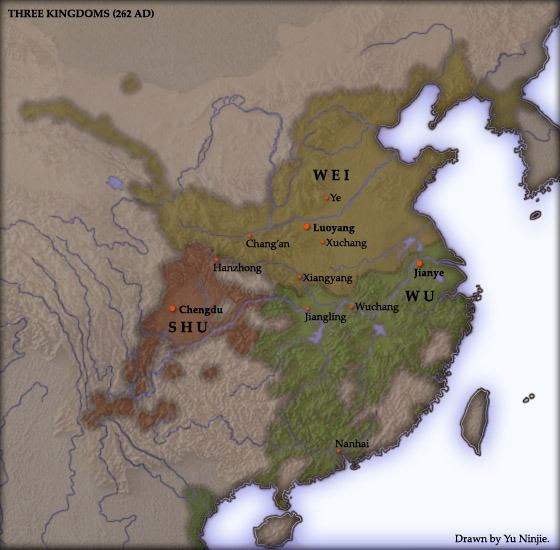- Shu Han
Infobox Former Country
native_name = aut|漢
conventional_long_name = Han
common_name = Shu
national_motto =
continent = Asia
region = Pacific
country = China
era = Three Kingdoms
status = Empire
government_type = Monarchy
year_start = 221
year_end = 263
event_start = Establishment
event_end = Conquest of Shu by Wei
p1 = Han Dynasty
s1 = Cao Wei
event1 =
date_event1 =
event2 =
date_event2 =
event3 =
date_event3 =
event4 =
date_event4 =
event5 =
date_event5 =
image_map_caption = The territories of Shu Han (in red), AD 262
capital =Chengdu
common_languages = Chinese
religion =Buddhism ,Taoism ,Confucianism ,Chinese folk religion
currency =Chinese coin ,Chinese cash
leader1 = Liu Bei
leader2 = Liu Shan
year_leader1 = 221 - 223
year_leader2 = 223 - 263
title_leader = Emperor
legislature =
stat_year1 =
stat_area1 =
stat_pop1 = 940,000Shu Han (
Traditional Chinese : 蜀漢,pinyin : Shǔ Hàn), sometimes known as the Kingdom of Shu (蜀 shǔ) was one of theThree Kingdoms competing for control ofChina after the fall of theHan Dynasty , based on areas aroundSichuan which was then known as Shu. Some historians argue it is the last Han dynasty becauseLiu Bei is directly related to the Han sovereignty. The other two states wereCao Wei in central and northern China, andEastern Wu in southern and southeastern China.History
During the decline of the Han Dynasty,
Liu Bei , a distant relative of the emperor, gathered together many capable men, and withZhuge Liang 's advice, took parts ofJing province at first, then Yi province andHanzhong . From these territories, he established a place for himself in China during Han's final years. In219 ,Lü Meng attacked and conquered Jing province forSun Quan . Subsequently, Liu Bei's trusted generalGuan Yu was executed by Sun Quan. AfterCao Pi seized the imperial throne in220 from Emperor Xian and proclaimed the Wei Dynasty, Liu Bei proclaimed himself to be the next Han emperor and the real ruler of China in 221. Although Liu Bei is said to be the founder of the "Shu Han dynasty", he himself never claimed to be the founder of a new dynasty; rather, he claimed to continue the heritage of the earlier Han Emperors.In
222 , the first major conflict of the Three Kingdoms period began. Liu Bei initiated an attack of over 40,000 men upon Sun Quan's state of Eastern Wu in theBattle of Yiling to retake Jing province. However, because of a grave tactical mistake, his line of camps was burned to the ground and his already numerically inferior troops were decimated. He survived the attack and fled toBaidicheng , but one year later he became ill and died there. He was succeeded by his son,Liu Shan .The Chancellor of Shu,
Zhuge Liang , made peace with Wu instead of taking revenge. He decided that it was more important to conquer Cao Wei and not only gain the fertile lands of the north but also to topple the Wei government and restore legitimacy to the Shu-Han Dynasty. He made several invasions to the north but failed each time, finally dying of sickness during his sixth attempt to conquer Wei.Jiang Wei , his eventual successor, also tried many times but was pushed back each time.In
263 , Wei took advantage of Shu's weakness and attacked. The brilliant strategies of the Wei generals,Zhong Hui andDeng Ai led to the quick conquest of Hanzhong and the subsequent conquest of the capitalChengdu . Jiang Wei surrendered to Zhong Hui and tried to incite Zhong Hui to rebel against Deng Ai, hoping to revive Shu Han by trying to take advantage of the ensuing chaos and bringing back the Emperor Liu Shan. However, his plan failed and he was killed along with Zhong Hui and Deng Ai by their soldiers. Afterwards, the Emperor Liu Shan was taken to the capital of Wei,Luoyang , where he was given the title Duke of Anle (安樂公; meaning Duke of Comfort) and retired in peace.However, Shu was not simply a nation of war. During times of peace, Shu began many
irrigation and road-building projects designed to improve the economy of Shu. Many of these public works still exist and are widely used. For example, theNine-Mile Dam is still present nearChengdu inSichuan province. These works helped improve the economy of Southwest China and can be credited with beginning the history of economic activity in the Sichuan area.Important figures
*
Chen Dao
*Chen Shi
*Chen Shou
* Chen Zhen
*Deng Zhi
*Dong Yun
* Empress Wu
* Empress Zhang (former)
* Empress Zhang (later)
*Fa Zheng
*Fei Yi
*Fu Qian
*Fu Shiren
*Fu Tong
*Guan Ping
*Guan Xing
*Guan Yu
*Huang Zhong
*Jiang Wan
*Jiang Wei
*Jian Yong
*Liao Hua
*Liu Bei
*Liu Feng
*Liu Pi
*Liu Shan
*Ma Chao
*Ma Dai
*Ma Liang
*Ma Su
*Mi Fang
*Mi Zhu
*Pang Tong
*Sun Qian
*Wang Ping
*Wei Yan
*Xiahou Ba
*Xu Shu
*Yan Yan
* Zhang Bao
*Zhang Fei
*Zhao Yun
*Zhuge Liang Rulers of Shu Han
221 –263 Posthumous name sFamily name (in bold) and first names Durations of reigns Era name s and their ranges of years"Convention: use family and first names" Zhaolie (昭烈 Zhāoliè) Liu Bei (劉備)221 -223 Zhāngwǔ (章武) 220 -223 Xiaohuai (孝懷 Xiàohuái) Liu Shan (劉禪)223 -263 Jiànxīng (建興) 223 -237
Yánxī (延熙)238 -257
Jǐngyào (景耀)258 -263
Yánxīng (炎興)263 ee also
*
Cao Wei
*Eastern Wu
*Three Kingdoms
*Personages of the Three Kingdoms
*Timeline of the Three Kingdoms period
*"Romance of the Three Kingdoms "
*Records of Three Kingdoms
*"Dynasty Warriors "
Wikimedia Foundation. 2010.
